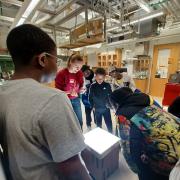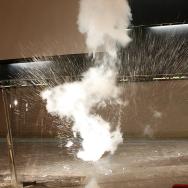At one of the many science, technology, engineering and mathematics educational programs run by Argonne National Laboratory over the summer, attendees tackled a variety of data exercises, including investigating London’s 19th century cholera crisis. Just as doctors at the time collected and analyzed data to determine the source of the epidemic, participants discovered the problem-solving potential of data science.
But unlike Argonne’s other STEM education programs, the attendees at this data workshop were not students but Chicago Public Schools high school teachers. The teachers’ typical subjects ranged from computer science to math to physics, but they all wanted to find ways to bring data science to their classrooms.
The three-week-long Data Science Institute for High School Teachers brought eight teachers together with staff members from Argonne, which is a U.S. Department of Energy national laboratory affiliated with the University of Chicago.
They met at Hyde Park Academy High School in Chicago, where they learned about computer science, experimented hands-on with coding tools and practiced teaching data science to youth.
“Working with teachers allows us to have an exponential impact on communities,” said institute lead and Argonne associate Miranda Kerr. “By introducing teachers to data science — an essential skill for students — and helping them bring the concepts to their classrooms, we have the potential to introduce more than 800 students to data science. If these teachers continue to spark students’ curiosity in data science in subsequent years, there’s a huge potential for a ripple effect of increased STEM learning.”
“Making meaning from data has always been an important part of all STEM courses, so it can be easily integrated into the curriculum,” said Deysi Emeterio, who is preparing to teach AP and honors physics at Whitney Young High School. “Data science is a growing field widely used in various industries, including marketing, healthcare, finance, banking, policy work and more. As a teacher, I want to help my students develop the knowledge and the set of skills that opens opportunities for them in their future careers.”
“I plan to take the activities and skills we were introduced to at the institute, and implement them into my AP computer science classes,” said Emmanuel Medina, a computer science teacher at Curie Metropolitan High School. “With minor modifications, these lessons will help students develop their analytical skills, build critical thinking skills, and engage their knowledge with real world events and issues.”
The teacher institute’s data science activities would not have been possible without the support of the Argonne Leadership Computing Facility. In the past, the Argonne Leadership Computing Facility has collaborated with educational programs like Coding for Science Camp and Big Data Camp, and key elements from those camps, such as case studies, informed the teacher institute’s design. Furthermore, the computing facility provided the server infrastructure for the Jupyter Notebooks, which offer new, interactive ways to learn and explore data science and coding in Python.
“The Argonne Leadership Computing Facility has been instrumental in providing the computing infrastructure that gives teachers and their students access to the computing resources necessary for data science,” said John Domyancich, Argonne’s STEM education learning manager. “Our years-long partnership supporting young peoples’ exploration of computing in science continues to blossom and reach more students.
“Enabling teachers to introduce data science into the high school classroom is tremendous,” said Michael Papka, professor of computer science at the University of Illinois-Chicago and the director of the Argonne Leadership Computing Facility. “I’m so happy that ALCF has been part of this journey; while we have worked with hundreds of students, by engaging with teachers, we will enable thousands. Allowing teachers to bring data science knowledge to all their future classes will give the students a tremendous head start.”
Now that the three weeks are over, teachers will continue to develop data science curricula for their high school classrooms. All the while, they will receive ongoing support from Argonne.
–Adapted from a story that originally appeared on the Argonne National Laboratory website.

